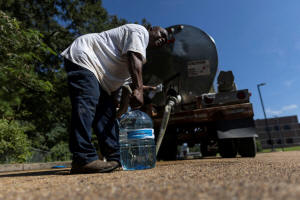Biden pledges support as Mississippi's capital still without drinking
water
 Send a link to a friend
Send a link to a friend
 [September 01, 2022]
By Eric Cox and Carlos Barria [September 01, 2022]
By Eric Cox and Carlos Barria
JACKSON, Miss. (Reuters) -U.S. President
Joe Biden on Wednesday pledged aid to Jackson, Mississippi, as the
majority-Black state capital endured its third day without drinking
water after a long-troubled water treatment plant failed.
The promise from Washington came as frustrated people in Jackson waited
in long lines amid sweltering heat at distribution sites where
volunteers handed out cases of bottled water.
Complications from recent floodwaters knocked the O.B. Curtis water
treatment plant offline on Monday night, with little reliable estimate
of when service will be restored. Water pressure remained low or
nonexistent, with some pipes carrying water that had not been fully
treated.
Officials warned all 150,000 people in Jackson and another 30,000 in
surrounding communities not to drink tap water without boiling it first.
Hundreds of vehicles snaked outside one water distribution site operated
by the Salvation Army, as men and women loaded up trunks and backseats
with cases of water. Others searched for water at stores where supplies
were depleted or sold out.

"It's sad, it's sad. And I can't even afford to move out of Jackson, so
I have to stay here and deal with this," said Kendra Payne, a mother of
two, after she bought a dozen cases of water at a Walmart.
Many businesses were shuttered while local schools and Jackson State
University, a historically Black college, resorted to online classes.
But Washington promised help was on the way.
The Biden administration approved an emergency declaration late Tuesday
to free up federal assistance, and Jackson Mayor Chokwe Antar Lumumba
told a news conference he had spoken separately with Biden and Vice
President Kamala Harris.
"Both assured me that the eyes of Washington are watching the city of
Jackson," Lumumba said.
White House Press Secretary Karine Jean-Pierre said millions of federal
dollars were already available for water projects in the city and state,
while the Federal Emergency Management Agency and Environmental
Protection Agency had been sent to Jackson.
[to top of second column]
|

A local worker pours water into a bottle
at a water distribution site at Forest Hill High School as the city
of Jackson is to go without reliable drinking water indefinitely
after pumps at the water treatment plant failed, leading to the
emergency distribution of bottled water and tanker trucks for
180,000 people, in Jackson, Mississippi, U.S., August 31, 2022.
REUTERS/Carlos Barria

The American Rescue Plan, approved at the start of Biden's
presidency last year, provides $450 million for water upgrades
across Mississippi, with the city of Jackson allotted $20 million
for water infrastructure, Jean-Pierre said. In addition, EPA loans
were available and a Pearl River flood control study was under way,
she said.
The federal funds could address what many locals say has been a lack
of investment in Jackson, which is more than 80% Black. Mississippi,
a former slave state that is 38% African-American, ranks toward the
bottom among the 50 states in many social indices.
"We are seeing the intentional divestment in communities that are
led by Black-elected officials," said Danyelle Holmes, a Jackson
resident and social justice organizer. "Extreme racist politics are
being put before the people. It's time that we put that to the
side."
The crisis has also revealed tension between the state government of
Republican Governor Tate Reeves, who has accused the city of
mismanaging the water plant, and the city government of the
Democratic Mayor Lumumba, who is African-American.
Even before the crisis, the city had been under a boil water notice
for the past month due to "elevated turbidity levels," which makes
the water appear cloudy. That followed a string of disruptions to
the city's water supply in recent years caused by high lead levels,
bacterial contamination and storm damage.

"Jackson is in a water crisis and we do not trust what water we get
to even bathe in," said Cassandra Welchlin, 49, a social worker. She
said her family of five was fortunate because her sister's place
outside the city was available for safe showers.
(Reporting by Eric Cox and Carlos Barria in Jackson, Brendan O'Brien
in Chicago, Rich McKay in Atlanta, and Daniel Trotta in Carlsbad,
Calif.; Editing by Deepa Babington, David Gregorio and Josie Kao)
[© 2022 Thomson Reuters. All rights
reserved.]
This material may not be published,
broadcast, rewritten or redistributed.
Thompson Reuters is solely responsible for this content. |